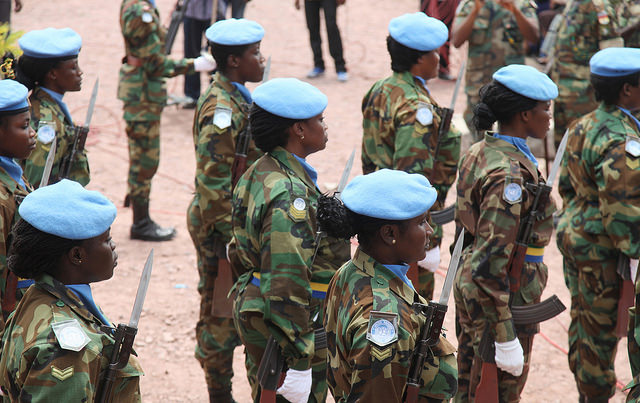
This article is part of a series on ‘Women, Peace and Security’ that The Strategist is publishing in recognition of International Women’s Day 2017.
When delivering a speech in advance of becoming the UN’s new Secretary-General, António Guterres made it clear that gender equality was a clear priority, not only for staff appointments with the organisation, but also in in peacekeeping deployments, in peace negotiations and in peace building through economic empowerment.
The international community has long recognised that gender equality and women’s empowerment are critical elements for building sustainable peace and security locally and globally. UN Security Council Resolution 1325 and the subsequent resolutions on Women, Peace and Security (WPS) affirm the importance of participation by women and the inclusion of gender perspectives in peace negotiations, peacekeeping operations and post-conflict peacebuilding and governance. The resolutions further stress the importance of equal and full participation by women as active agents in the promotion of peace and security, and call for building gender responsive capabilities among all personnel involved in maintaining peace and security. Women and girls are poised to be key drivers of progress and growth, but they need to be empowered through equal rights and equal opportunities. They need to be valued as leaders, peace-builders and breadwinners in their communities and societies.
In his message to the Special Committee on Peacekeeping Operations in February 2017, Guterres decreed that achieving gender parity in all respects is as critical in the field as it is anywhere else. He also said that the UN absolutely must increase the number of civilian and uniformed women, as well as the number of women in leadership positions in peacekeeping operations, peace processes and the ranks of special envoys. Despite efforts since the adoption of Resolution 1325, the participation of women in armed forces generally hasn’t changed significantly. In 1993, only 1% of all deployed uniformed personnel were women. By 2016, women comprised less than 4% of UN peacekeepers globally, accounting for about 3% of UN military personnel and about 9.7% of UN police.
Those rates fall far short of the goals set for women’s participation in peacekeeping missions by Resolution 2242 in 2015 (which called for member states to double the numbers of women in military and police contingents of UN peacekeeping operations over the next five years). The reasons for this vary among member states, but research in 2013 offered that the state of play reflects a lack of understanding about Resolution 1325 and UN policy on gender equality in peace operations, a gap in data and analysis, and the prevalence of social norms and biases that perpetuate gender inequality within the security sector. Much work is needed, through implementation of national action plans on WPS and gender strategies, to address those barriers to women’s equal participation in national security forces.
The UN also recognises that greater numbers of women in peacekeeping have been proven to increase the UN’s credibility, its protection reach and its relationship with communities, as well as to decrease incidents of sexual exploitation and abuse (SEA). SEA has become the maelstrom of modern peacekeeping. Specific investigations commissioned by the UN, for example, in the Central African Republic in 2016, identified that UN peacekeepers have been committing acts of child abuse and exploiting women, girls and boys, with much of that abuse characterised as sexual favours in return for food or cash.
Inevitably, SEA is capitalising on the vulnerability of the local population due to poverty, lack of access to resources or power, inequalities in social status, and enhancing women and girl’s exposure to sexual and gender-based violence. The UN Security Council, in building on previous efforts to address SEA, has taken steps through the adoption of Resolution 2272 in 2016 to implement better procedures for investigating such misconduct and international crimes. In addition, the Secretary-General created a high-level task force in 2017 to examine ‘outside the box’ measures to prevent, address and respond to SEA.
Research suggests that the presence of female peacekeepers will help address SEA. To promote ‘out of the box’ thinking will also require promotion of gender equality in missions and ensuring local women and girls’ equality and empowerment, in order to decrease dependency on peacekeepers. A universal response needs to address a holistic view of gender inequalities: girls’ access to a quality education, women’s economic empowerment (critical for safeguarding food security), universal access to sexual and reproductive health and rights, ending violence against women and girls, and the inclusion of women’s voices, leadership and influence in peace processes and peace building.
A gender perspective needs to be a consideration from the outset when missions are mandated through to their transition and exit, and reinforces the link between peace, security and development. Only by achieving gender parity across those important and influential factors further exacerbated in conflict, can we conclude that we’re maximising our capacity to sustain peace and security.

